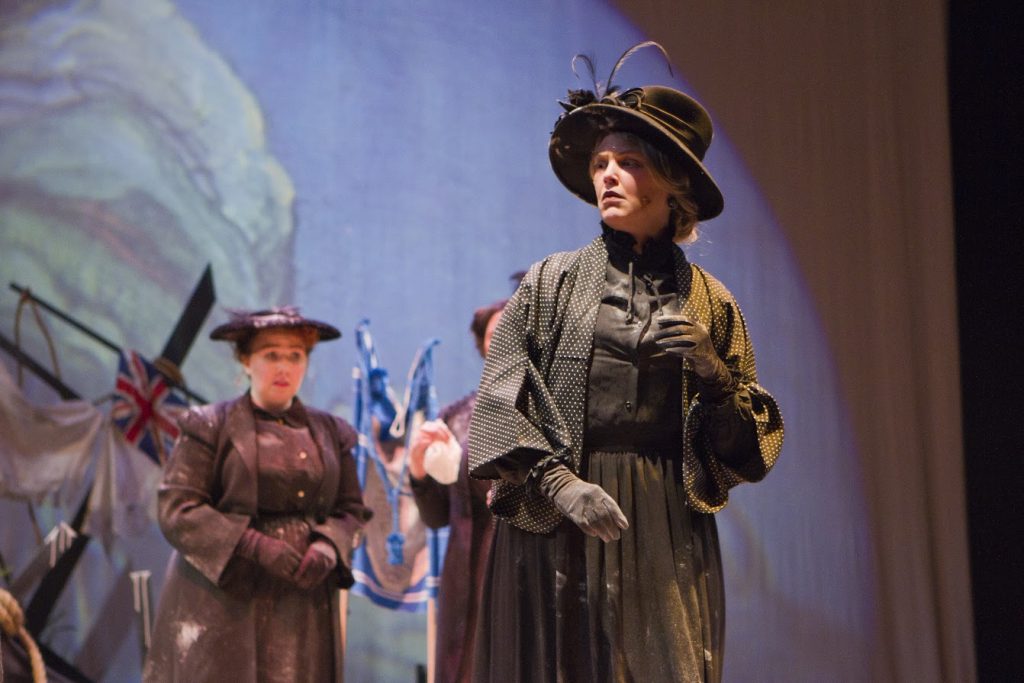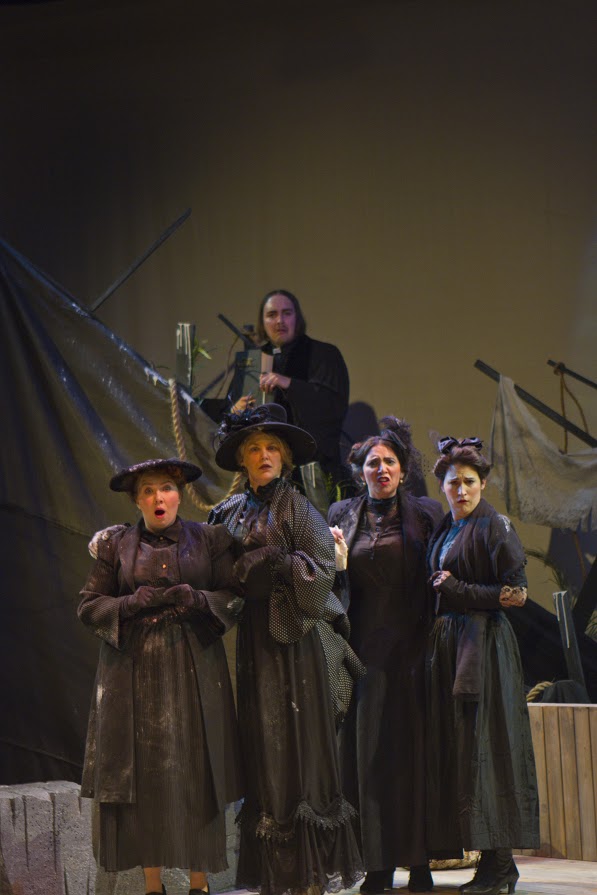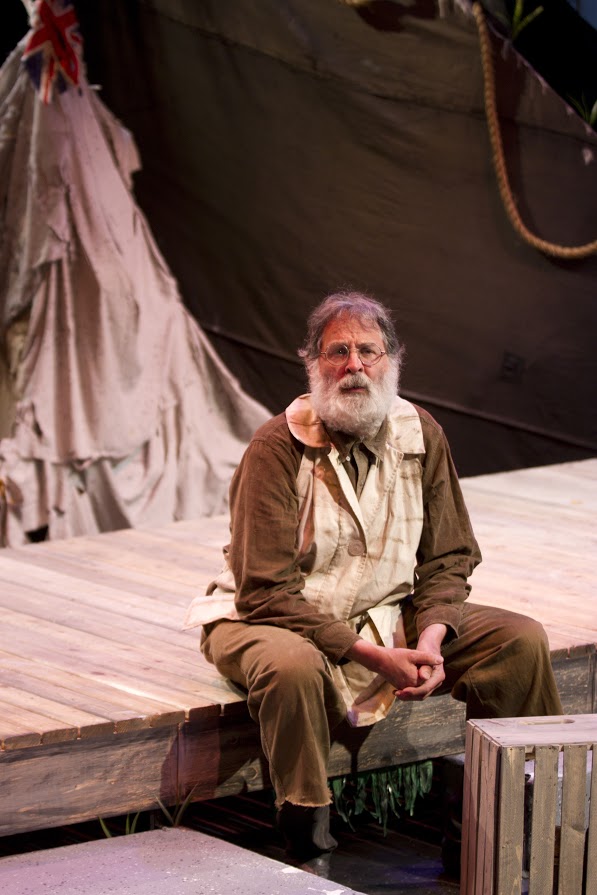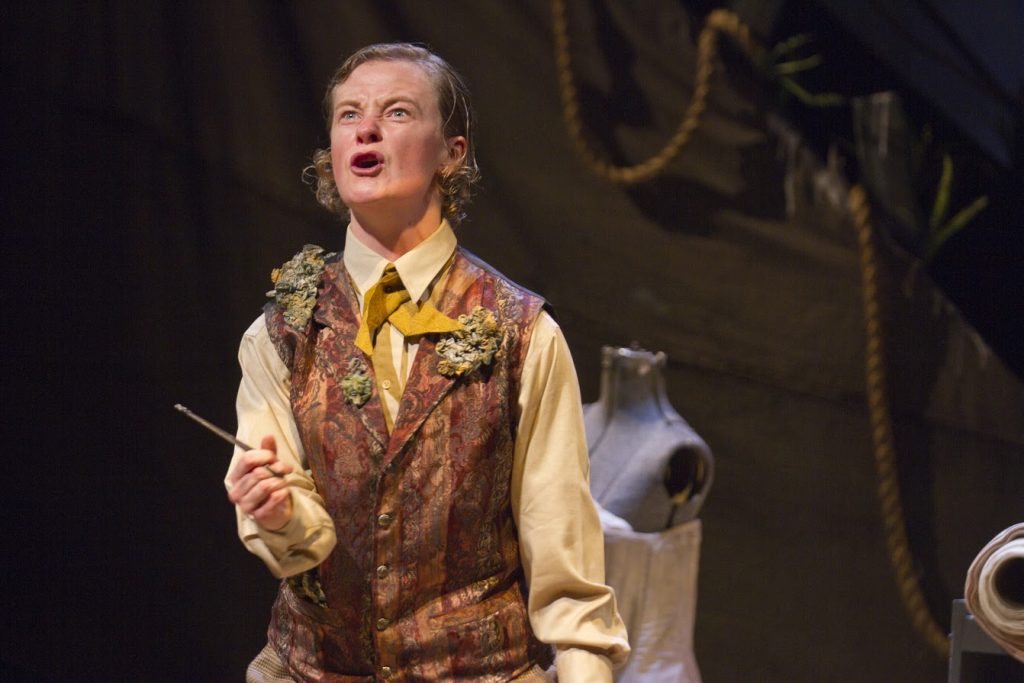
Credit: Erin Aberle Palm
At Jericho Arts Centre until May 19, 2019
Tickets from $18 at theatrewire.com
Posted May 4, 2019
For a play that begins like Shakespeare’s The Tempest with a shipwreck, the Sea is quirkily funny and resoundingly defended as a comedy by those who have the temerity to produce it. Written by English playwright Edward Bond in 1973, The Sea is set in 1907 in a suffocatingly small, East Anglia seaside village peopled with odds and sods – mostly odds.
Take Hatch (Elizabeth Kirkland), for example: a draper by day, Hatch is a paranoid, conspiracy theorist by night. Believing aliens are about to invade, he mistakes Willy (Dylan Floyde), a survivor of the wrecked sailboat, for the enemy. And then there’s Evens (Stephen Aberle), a beach hut-dwelling, whisky-swilling wise fool – too drunk to help a drowning man at the height of the storm and about whom another character says, “If you wrung him out you could open a brewery.” With the exception of Rose (Michelle Morris) and Willy, the place is rampant with eccentrics not the least of which are the men of the Coast Guard who actually fire on the small sailboat that is already foundering in the dark sea.

Credit: Erin Aberle Palm
There’s a peculiar charm to this Slamming Door Artist Collective, directed by the company’s co-founder Tamara McCarthy, although the play’s socio-political commentary is not always as transparent to a 2019 Vancouver audience as it was in London, 1973. Certainly, the ineptitude of the Coast Guard in the play – emblematic of a dithering bureaucracy – and the irrelevancy of the Church – as illustrated by the ineffectual Vicar (Raes Calvert) – are obvious targets of the playwright.
Born into a lower working-class North London family in 1934, Bond would have been painfully aware of the hierarchical class system still in full flower. He captures this haughty entitlement in the character of Mrs. Rafi (marvellously, condescendingly played by Genevieve Fleming) who lords it over everyone including her ‘companion’ Mrs. Tilehouse (Melissa Oei) as well as the cast of her benefit production of Orpheus and Eurydice. But most of all, she destroys unstable Hatch from whom she repeatedly orders expensive yard goods that she unfailingly rejects upon delivery from Birmingham to his shop.
This production is kept afloat with excellent performances by Fleming (also the company’s co-founder) and Aberle – who play polar opposites in their characters’ response to the absurd world in which they find themselves: Mrs. Rafi asserts her authority and rules the town with a Thatcher-like rigidity while Evens lives a hermit’s life where the sand meets the sea.

Credit: Erin Aberle Palm
This small company performs a small miracle with Edwardian costumes by Cheyenne Mabberley and Chantal Short: long, layered gowns and fabulous feather-trimmed chapeaux. Set design by Sandy Margaret evokes The Tempest with ship wreckage and rigging set against changing images created by Celeste English on an upstage scrim.
Despite excellent performances and very fine on-a-shoestring budget, The Sea is a bit of two-hour slog. However, the payoff is a marvellous monologue superbly executed by Fleming late in the play: “I’m afraid of getting old. I’ve always been a forceful woman. I was brought up to be. People expect my class to shout at them. Bully them . . . Sometimes I think I’m like a lighthouse in their world. I give them a sense of order and security . . . I’m tired of being a sideshow in their little world. Nothing else was open to me.” Smacking of the plight of Hedda Gabler, the monologue is full of regret at a life lived small. Generously, Mrs. Rafi gives good advice to the young couple who now must make their own way in the world.

Credit: Erin Aberle Palm
The Sea is a peculiar play: a decidedly odd mix of comedy and social criticism. But considering Edward Bond is counted amongst the most important contemporary English playwrights, I’m grateful to Slamming Door for setting out on this particular Sea.

